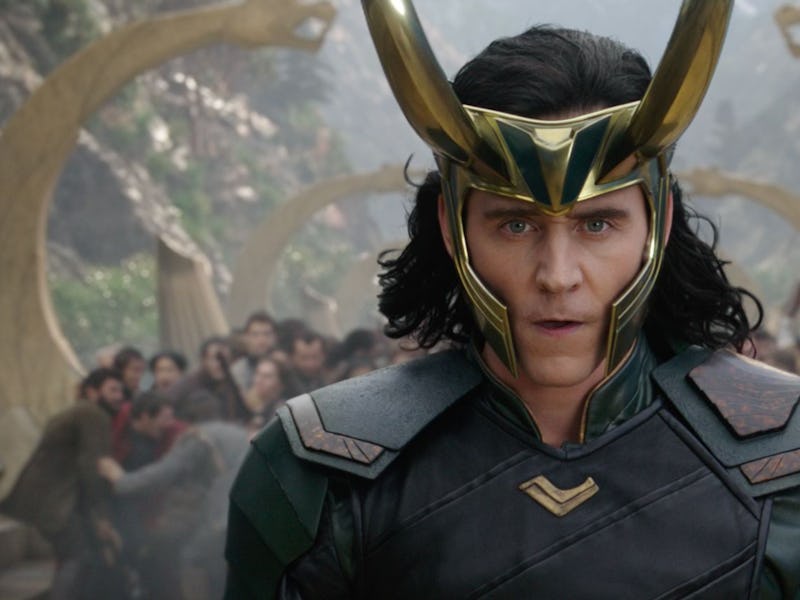Loki is changing the way we think about Marvel's funniest movie
Thor: Ragnarok was a zany, comic romp through space that still ranks as the funniest Marvel movie. It was originally meant to feel very different.

Seven years ago, when Kevin Feige first announced the third phase of the Marvel Cinematic Universe, no one could have seen Thor: Ragnarok coming.
In the MCU’s third chapter, emotionally seismic and decidedly serious superhero epics were in steady supply, from Captain America: Civil War and Black Panther to Avengers: Infinity War and Endgame.
Out of those films Marvel announced back in 2014, Thor: Ragnarok ended up hitting theaters as something remarkably different than what was initially teased, both tonally and in terms of its story. As directed by Taika Waititi, Ragnarok was a colorful, comedic romp (albeit one that led to the destruction of Asgard).
Now, Loki is restoring some of the grave importance Marvel may have originally envisioned for Ragnarok.
Originally billed as a 2017 summer tentpole for Marvel (it ended up arriving on November 3 that year), Thor: Ragnarok was introduced by Feige as “a very important movie” that will “take Thor to another level [in] his own franchise... and will impact everything to come afterwards.”
Feige wasn’t exactly off-base there: Thor: Ragnarok did turn out to be a very important movie. Directed by Taika Waititi, the movie took Thor to another level, and the ramifications of Ragnarok were felt across Infinity War and Endgame. And, of course, Thor: Love and Thunder is due to hit theaters in 2022, with Waititi back in the director’s chair; it’s sure to feel more like a sequel to Ragnarok than, say, predecessor Thor: The Dark World.
Kevin Feige announces Marvel’s “Phase Three” movies in 2017.
But when it was originally announced by Feige, Thor: Ragnarok was teased with ominous music and stone-gray typeface that evoked ancient Norse oral traditions. There was nothing in that upfront to suggest the technicolored ‘80s-inspired action-comic romp Ragnarok ultimately became — because the film was rebuilt from the ground up during development.
As reported by Vanity Fair in 2017, it was star Chris Hemsworth who asked for a tonal shift in the Thor franchise. And in a rare move for a studio, Marvel listened. Comparing the announcement to Waititi’s final cut, the stylistic gulf between the two is massive.
This brings us to Loki. Starring a “variant” of the trickster anti-hero who technically hasn’t experienced the events of the MCU post-2012’s The Avengers, Loki (Tom Hiddleston) understands Ragnarok and the end of Asgard as concepts rather than lived experiences he can remember. In episode two, “The Variant,” Loki is tasked with figuring out where a superior version of himself might hide across the universe. Loki instinctively imagines that apocalypses are ideal hiding places for masters of chaos such as himself. Why?
“If everything and everyone around you is destined for imminent destruction,” Loki explains, “then nothing that I say or do will matter.”
Apocalypses like Ragnarok are ideal hiding places for a time-hopping Loki variant to hide.
On a more conceptual level, Loki sees Ragnarok in the way Marvel fans saw it play out in Thor: Ragnarok: as a big, scary apocalypse. And like Marvel fans seven years ago, Loki wants to see it happen so badly. But in the timeline of the other characters in Loki, not to mention audiences, Thor: Ragnarok is already Marvel history. And due to Waititi’s creative stylings, the film was approached with an unusually zany tone, existing in fans’ memories most prominently as an illustration of what Marvel can pull off on the more comedic side of its tonal spectrum.
But here comes Loki, trying to remind us what that movie was actually about: the apocalypse, full of death, destruction, and other serious stuff. Though he ruins Mobius’ (Owen Wilson) lunch to prove his point (“Ragnarok obliterates the salt!”), Loki successfully emphasizes that Ragnarok was a more cataclysmic event than some fans likely remember it as.
The Loki in Disney+’s Loki never experienced the events of Thor: The Dark World or Thor: Ragnarok.
In Norse mythology, Ragnarök was the fabled end of days, in which the gods Odin, Thor, and Loki died and Asgard was submerged underwater, planting the seeds for its dramatic rebirth. Thor: Ragnarok, which grossed $854 million dollars worldwide, did feature such an apocalypse, and its comic tone did ultimately service that premise in a somewhat roundabout way. By destroying all we knew about the staid, Shakespearean-influenced Thor films that had preceded it, Ragnarok paved the way for the franchise to become something new.
Thor: Ragnarok had an apocalypse — but, then again, it also had a Hulk and ample distractions from the brutality of Asgard’s downfall. The series Loki, in spite of its clunky salt metaphor, is already reminding Marvel fans just how severe Ragnarok was for Asgardians across the universe (even if, in their sound and fury, apocalypses are also kind of fun).
Loki streams new episodes Wednesdays on Disney+.